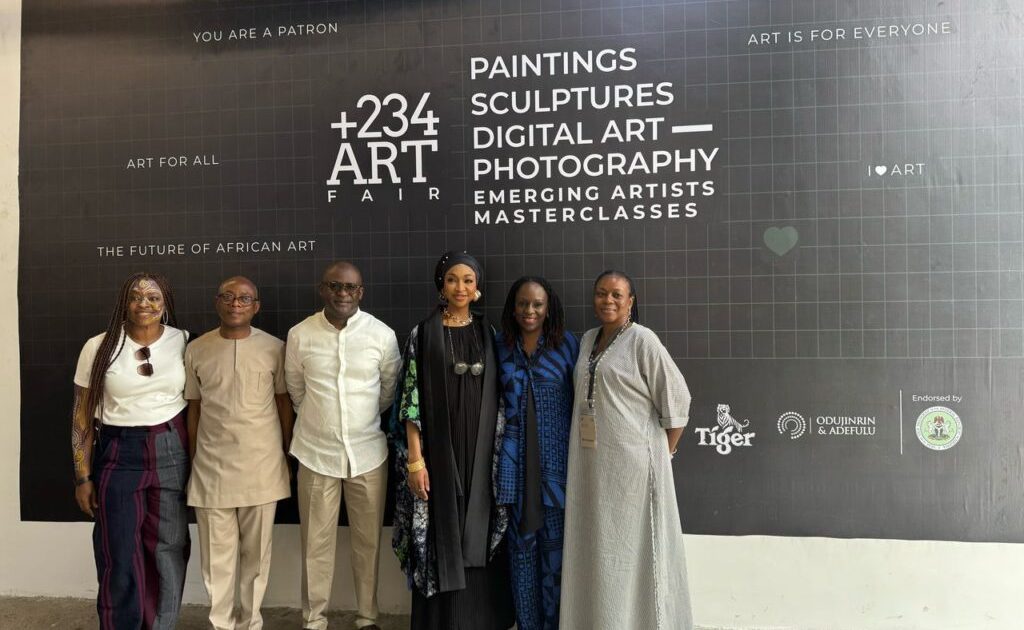Hannatu Musawa, Nigeria’s Minister of Art, Culture, and Creative Economy, championed the imperative of public-private partnerships to bolster the nation’s art industry during her address at the International Art Fair in Lagos. She emphasized the symbiotic relationship between these sectors, highlighting the necessity of collaborative efforts to unlock the full potential of Nigeria’s creative economy. Musawa commended the event’s sponsors, including Ecobank Nigeria, the Africa Finance Corporation, and Soto Gallery, for their instrumental role in providing a vital platform for emerging artists to showcase their work and connect with a wider audience. This collaborative spirit, she argued, is essential for nurturing talent and driving the industry’s growth. The Minister’s presence at the fair served as a testament to the government’s commitment to fostering the art sector and integrating it more effectively into the global creative landscape.
Musawa lauded the diverse and vibrant display of artistic talent at the fair, noting the impressive range of mediums, including painting, photography, and sculpture. She described the event as a powerful reflection of Nigeria’s rich artistic heritage and a bridge to the future, showcasing the evolution of storytelling through the unique lens of young Nigerian artists. This emphasis on the dynamic nature of the art scene underscores the importance of nurturing emerging talent and providing them with the necessary resources and exposure to thrive. The minister’s enthusiastic endorsement of the artists’ work reinforces the government’s dedication to promoting and celebrating the country’s creative potential.
The Minister’s call for increased collaboration between public and private entities emphasizes the crucial role of both sectors in fostering a sustainable and thriving art ecosystem. Public sector involvement can provide vital infrastructure, funding, and policy support, while the private sector can bring resources, market expertise, and opportunities for commercialization. This synergistic approach can create a more robust and resilient art industry, capable of generating economic growth and cultural enrichment. Musawa’s emphasis on partnership highlights the government’s understanding of the complex interplay required for the art sector to flourish.
Musawa underscored the importance of providing young artists with the necessary exposure and support to contribute meaningfully to the nation’s economic growth. She pledged the ministry’s continued commitment to initiatives that foster value creation within the creative industry, ensuring a supportive environment for artists to develop their skills and achieve commercial success. This commitment aligns with the government’s broader economic diversification strategy, recognizing the potential of the creative industries to contribute significantly to GDP and job creation. The Minister’s assurance of ongoing support underscores the government’s belief in the transformative power of the arts.
Furthermore, Musawa emphasized the need for government involvement and active participation in the art sector’s sustainable development. Her presence at the fair’s second edition, she noted, signified the administration’s commitment to elevating Nigeria’s creative industry onto the global stage. This commitment extends beyond mere rhetoric, with the Minister assuring comprehensive government support to position Nigerian artists and their work within the international community. This strategic focus on internationalization aims to increase the visibility and recognition of Nigerian art, fostering opportunities for cultural exchange and economic advancement.
In conclusion, Musawa’s address at the International Art Fair articulated a clear vision for the future of Nigeria’s art industry. She emphasized the critical role of public-private partnerships, the importance of nurturing young talent, and the government’s commitment to supporting the sector’s sustainable growth and internationalization. Her words served as both a celebration of the vibrant creativity on display and a call to action, urging stakeholders across the public and private sectors to collaborate in realizing the immense potential of Nigeria’s artistic landscape. The Minister’s passionate advocacy for the arts signals a promising era for the creative industries in Nigeria, with the potential to drive economic growth, cultural enrichment, and national pride.














